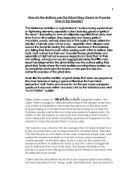Witch Child – Celia Rees
How does Rees use Language to Make the Reader Empathise with Mary?
In the story, Witch Child, Celia Rees uses many different components of language to make the reader empathise with the main character, Mary. Witch Child is a book, compiled of diary entries, written by a young woman called Mary, who lived in the 17th century. Rees uses empathy to make the book seem more personal, like the reader is the only one reading it. Empathy is also important, because it is when you understand and identify with somebody else’s problems or emotions, and if the reader feels a bond with Mary then they are going to continue reading the book. It keeps the book gripping and stimulating. Celia Rees creates empathy in many ways, using a clever but subtle style. She uses factors such as sentence structure, emotive language and tone to provoke a feeling, similar to the one she has created for Mary. Rees’s style means that without the reader realising it, they become hooked. In this essay, I will be finding out how she uses language to do this and will be including quote from the book.
At the beginning, before the story begins we are given a little background information. This information is not true but we are told that the diary entries were found hidden and that they are a true story. Witch Child is in fact entirely fiction but this prologue helps with creating empathy because if the reader believes it is real then their emotions are also more likely to be real. If something is realistic then you are going to believe it where as if you know it is made up, then you will not relate to it.
Also the way that it is in diary format helps as well. It makes it seem more personal and make the reader feel valued because they have been allowed to read personal thoughts and feelings.
The language Celia Rees uses has a large effect on the way the reader interprets her words. Some of the language is in the style of how it would have been written in the time the book is set. Sometimes the words in the sentence are in a different order to what is familiar today, and sometimes she just uses uncommon words. However, Rees has used a simplified language, to appeal more to her target audience, of teenage and older children. This is sensible because a diary in the 1600’s would have been written in such a way that modern children/teenagers may have struggled to understand the meaning behind her words. Celia Rees intentionally chose this language, and it has helped the book seem more realistic.
Mary goes through a lot as she grows from a girl to a woman. At the beginning her grandmother, who was her main guardian and who she was very close to, was killed after being accused of being a witch. This is a key part of the story, and is carried through the story. It makes the reader empathise with Mary because her grandmother is her only family, and the only one that has ever cared for her, so when she is taken away it would have been very upsetting. One quote from the book that I think illustrates this well is ‘The men watched, as the woman did this and my grandmother was forced to stand before their gloating eyes, a naked old lady…’ This quote is from when her grandmother is going through witch tests. The reader empathises with Mary at this point because Mary empathises with her grandmother. The words ‘naked’ and ‘old’ make her grandmother seem vulnerable and helpless. She sounds vulnerable because she is naked and being watched by strangers. The way she is described as ‘old’ makes her seem defenceless, which to some extent was probably true. She had no dignity in front of the men and was probably embarrassed and ashamed. The word ‘forced’ makes it sound like the men have bullied her into it. Rees tells the story so that the men seem higher and superior (but cruel) and her grandmother seems humble and this makes her sound innocent. The men seem quite sick and perverted for wanting to watch an old woman naked. The word ‘gloating’ makes it sound like they are proud of themselves and happy that an old woman is being hurt. The men’s eyes are described which implies that they are watching intently. We feel empathy for Mary because she must have been there, to know the story is such detail, and the reader feels bad because they know there is nothing she can do. Also the reader feels guilty because the way Mary has written ‘my’ makes it sound like she is quite protective of her grandmother. Also you get the impression that, understandably, Mary resents the woman that is hurting her grandmother and as I have already said, the reader automatically thinks the woman and men are cruel and the bad ones, therefore again the reader empathises with Mary. This is also near the first time the witch theme is mentioned. The quote seems so horrific it makes you think that they wouldn’t just do it to anyone. This makes you wonder whether she was actually a witch, and this question is continued to be asked throughout the book.







